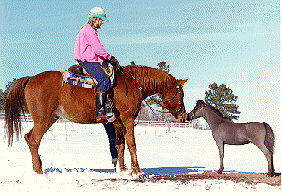![]()
![]()
 The information contained in this
"Care of Mini Horses" is what we have found from
26 years of experience from
breeding, caring for and loving miniature horses. It is not intended to replace a
veterinarians opinion but to give you food for thought. The
vaccination, deworming and
feeding information is what we have found works for us. Ask someone else and you are
likely to get a different answer. :-) Included you will find
general information on foaling,
breeding, training and
color genetics of mini.
The information contained in this
"Care of Mini Horses" is what we have found from
26 years of experience from
breeding, caring for and loving miniature horses. It is not intended to replace a
veterinarians opinion but to give you food for thought. The
vaccination, deworming and
feeding information is what we have found works for us. Ask someone else and you are
likely to get a different answer. :-) Included you will find
general information on foaling,
breeding, training and
color genetics of mini.
We have very few health problems with our miniature horses, they are naturally a very hardy, healthy animal. We find the more they are treated like a horse, the healthier and happier they are.
Pearls of wisdom on caring for your mini:
-
Always be willing to ask questions, listen, and learn. No one person knows it all and there is always something new to be learned.
-
Get to know your horse's personality and body language on a daily basis because their body language speaks volumes about how they are feeling. Be alert for changes to their norm.
-
It is less expensive to call you vet when you first notice a problem with your horse. The longer you wait to call, potentially, the larger the problem will be, it may be more difficult to treat, and as a result, will be more expensive.
-
A horse, miniature or full size, is always hungry. If they are not interested in eating - something is wrong.
STOMACH ULCERS: Infrequently, you will find a miniature horse grinding it's teeth, not interested in feed, or lying on it's back with it's feet in the air. These can be symptoms of gastric ulcers. Certain individual miniatures, just like people, may be high strung, nervous or more sensitive to change. These are the ones that may develop ulcers if put under stressful situations like showing or change in routine. Most ulcers are easily treated using GastroGard if caught early. Ask your vet for his/her recommendation on medications to use.
MEDICATION WARNING: BUTE or PHENYLBUTAZONE is commonly used for the relief of inflammatory conditions in full size horses. This product may produce severe gastric ulceration in miniature horses because it is easily overdosed, especially using this medication in paste form. If absolutely necessary, and your vet recommends it - make certain that you know the exact weight of you miniature. Give the dosage needed for your miniatures weight by using bute tablets made for dogs and cats. Personally, I prefer to use Banamine (flunixin meglumine) when possible.